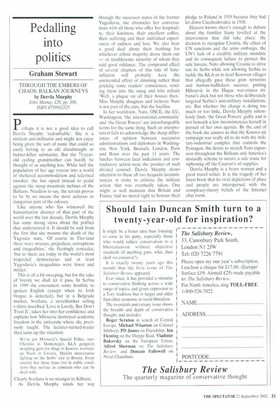Pedalling into politics
Graham Stewart
THROUGH THE EMBERS OF CHAOS: BALKAN JOURNEYS by Deryla Murphy John Murray, £20. pp. 388, ISBN 0719562325 Perhaps it is not a good idea to call Dervla Murphy 'redoubtable'. She is a strident anti-militarist and might not enjoy being given the sort of name that could so easily belong to an old dreadnought or hunter-killer submarine. But the 71-yearold cycling grandmother can hardly be thought of as anything less. While half the population of her age retreat into a world of sheltered accommodation and televised snooker, she has opted instead to pedal against the steep mountain inclines of the Balkans. Needless to say, the terrain proves to be by no means the most arduous or dangerous part of the odyssey.
Like anyone who has witnessed the humanitarian disaster of that part of the world over the last decade, Deryla Murphy has some strong views about the politics that underscored it. It should be said from the first that she mourns the death of the Yugoslav state. 'Of course in Tito-land there were stresses, prejudices, corruptions and inequalities,' she fleetingly concedes, 'but so there are today in the world's most respected democracies and at least Yugoslavia's inequalities were fewer and milder.'
This is all a bit sweeping, but for the sake of brevity we shall let it pass. In Serbia in 1999 she encounters some hostility to spoken English (except when its Irish brogue is detected), but in a Belgrade market, Svetiana, a streethavvker selling t-shirts inscribed 'Love is Lovely, But Don't Trust It', takes her into her confidence and explains how Milosevic destroyed academic freedom in the university where she previously taught. The lecturer-turned-trader then sums up the situation:
We've Rot Milosevie's Special Police, neoChetniks in Montenegro. KLA gangsters swapping guns for drugs in Kosovo, warmedup Nazis in Croatia. Muslim mercenaries fighting on the Serbs' side in Bosnia. Every country has those types but in stable conditions they surface as criminals who can be dealt with.
Clearly Svetlana is no stranger to Kilburn. As Deryla Murphy winds her way through the successor states of the former Yugoslavia, she chronicles her conversations with all those who offer her hospitality, their kindness, their excellent coffee, their suffering and their individual experiences of sadness and loss. We also hear a good deal about their loathing for whichever ethnic majority drove them out — or troublesome minority of whom they said good riddance. The compound effect of several chapters of this tale of hateinflation will probably have the unintended effect of dimming rather than pricking some readers' consciences, sending them into the smug and trite refrain 'Well, a plague on all their houses then.' Miss Murphy disagrees and believes Nato is not part of the cure, but the bacillus.
In her worldview, Nato, OSCE, the EU, Washington, 'the international community' and the Great Powers' are interchangeable terms for the same thing. Such an interpretation fails to acknowledge the sharp differences of opinion between successive administrations and diplomats in Washington, New York, Brussels, London, Paris and Bonn over the past 11 years. The lurches between fatal indecision and contradictory action were the product of such divided counsel. Deryla Murphy draws attention to these all too frequent inconsistencies in order to criticise the military action that was eventually taken, One might as well maintain that Britain and France had no moral right to honour their pledge to Poland in 1939 because they had let down Czechoslovakia in 1938.
Heaven knows there's enough to debate about the familiar litany levelled at the intervention that did take place: the decision to recognise Croatia, the effect of UN sanctions and the arms embargo, the UN's lack of a credible military mandate and its consequent failure to protect the safe havens, Nato allowing Croatia to drive out its Serbs while not allowing Serbia to tackle the KLA or to level Kosovan villages that allegedly gave these grim terrorists and human-traffickers succour, putting Milosevic in the Hague war-crimes tribunal's dock but not those who deliberately targeted Serbia's non-military installations, etc. But whether the charge is doing too much or too little, Deryla Murphy relentlessly finds 'the Great Powers' guilty and is not beneath a few inconsistencies herself in pursuit of her own agenda. By the end of the book she assures us that the Kosovo air campaign was really all to do with the military-industrial complex that controls the Pentagon, the desire to stretch Nato expansion throughout the Balkans and America's dastardly scheme to secure a safe route for siphoning off the Caspian's oil supplies, Deryla Murphy is a brave woman and a great travel writer. It is the tragedy of her latest book that its vivid depictions of place and people are interspersed with the conspiracy-theory beliefs of the Internet chat room.










































































 Previous page
Previous page